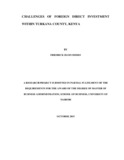| dc.description.abstract | FDI has long been recognized as an important component for economic growth and development; it has led to the revolution of several economies through technological advancements, job creation and increasing productive capacity. African countries, with their huge development gaps, need foreign investments to boost their economies in order to lift their populations out of poverty (Duce and Maitena, 2003). Caves (1996) observe that the rationale for increased efforts to attract more FDI stems from the belief that FDI has several positive effects. Generally speaking, the contribution to Turkana County economic development made by overseas investors(especially in the oil and gas sectors) may be the most distinguishing feature of the county‟s FDI so far realized. While it is difficult to provide an accurate estimate of the total dollar value of FDI, it is undeniable that these investors are helping transform an economy characterized mainly by inflexible state-owned enterprises into a dynamic economy with prominent high technology enterprises as well as steering infrastructural, educational and key facilities. With their knowledge of multiple business cultures, they taught local Turkana people about the working rules of a market- oriented economy. In a county whose culture has dominated for centuries, both investment behavior and the business practice of locals likely will remain part of foreign business culture (Angresano and Zhang, 2000).However, global capital and product markets are becoming increasingly integrated, open and competitive. Such integration implies that the investment climate for non-Kenyan investors will continue changing. The future of FDI in Turkana and Kenya will depend upon the potential investor‟s perceptions of the benefits and costs of investment climate relative to those in the rest of the world.Despite the document evidence of the effects of foreign direct investment in host country, implementation of foreign direct investment face challenge in the host countries. The study sought to establish the challenges facing foreign direct investment within pastoralist counties in Kenya. A case study research design was adopted. The study employed face to face interview as a primary data collection method. The content analysis was used to analyze the respondents‟ views about challenges of foreign direct investment in Turkana County Kenya .The studies found that political instability adversely affect foreign direct investment. Ethnic conflicts that have been experienced in the northern regions of Kenya have contributed to lack of foreign direct investment in these areas. The study establishes that corruption has discouraged foreign direct investment in Kenya by bringing about uncertainties and increasing the risk of investment. The study also concludes that corruption has led to mismanagement of the resources in Turkana County, consequently resulting in increased poverty levels in these areas. The findings revealed that adequate and readily natural resources boost foreign direct investment in a country. The study s recommends that political leaders in these areas should ensure that they preach a message of peace and unity to increase safety and reduce uncertainties associated with political conflict. This way more foreign investors will be attracted to investing in these areas. Natural resources present in Turkana County such as gemstones, gold, saltlicks, wildlife and oil must be used in such a way to promote growth in the areas with the aim to reduce poverty levels in this area. | en_US |

